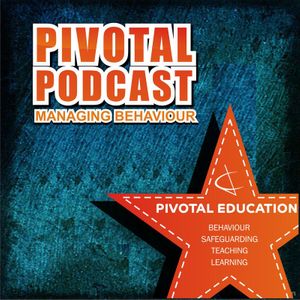Nikki Giant – ‘Giant Steps for Equality’ – PP89
Pivotal Podcast - A podcast by Pivotal Education

Categories:
It was great to catch up with Nikki Giant this week, after hearing her talk at the Pivotal Conversations Mental Health Conference in the Summer. Nikki is the founder and director of Full Circle. She’s worked in youth development for over a decade, and is 100% passionate about supporting young people to reach for their potential. Before setting up Full Circle, Nikki worked in bullying prevention in the UK, helping schools, youth and community settings across a Local Education Authority to effectively prevent and respond to all forms of bullying. Taking a break from bullying – and the UK – Nikki subsequently took a role with one of the largest girls organisations in the USA, the Girl Scouts of America, where she developed a passion for tackling gender-specific issues. She’s also a qualified counsellor and a bit of a serial entrepreneur. As a freelance consultant, Nikki specialises in issues related to education and youth well-being. Follow her on Twitter or connect with her on LinkedIn to learn more. What affects girls and young women? Nikki believes that the issues affecting girls are much the same as those affecting boys but they sometimes manifest themselves in different ways. Some which Nikki has picked up specifically include: * Body image problems * The impact of the media * How young women perceive themselves and their relationships with others * Cyber-bullying * Skewed understanding of what healthy relationships are Girls are very good at hiding their problems and some things tend to be dismissed as ‘girls being girls’ or being ‘over-emotional’. Teenagers are particularly prone to this as it’s easy to assume problems are down to the normal difficulties of the teenage time. Can we create gender-equal learning environments? Nikki thinks this is very important for girls and boys. As girls generally attain at a higher level than boys we tend to focus on boys’ attainment but the longer-term picture for girls and young women is more of a concern. In the UK we still have a gender pay difference and in certain professions, particularly in STEM (science, technology, engineering and maths) subjects, girls and women are under-represented. Neither do we have enough women in leadership positions. We should focus on these issues as young as possible and not wait until our young women and girls become adults. From the primary setting, through GCSE options and when considering careers advice, we should make young people aware that there is no such thing as a job for a boy or a job for a girl. Some of our girls don’t receive these positive messages at home so we as teachers, youth workers or any kind of adult working with children have a responsibility to give these messages. Role models Girls may see women represented in school Senior Leadership Teams but it’s also really important to bring in external role models as well, according to Nikki. Bringing in female engineers, scientists or computer programmers helps to make the concepts real. Visits are also powerful so it’s beneficial to develop links with employers, particularly when considering the gender equality of work experience opportunities but don’t wait until secondary school – this is also important in primary settings. European projects are available to participate in so you can share good practice. Girls and mental health This is an important area for boys and girls but, again, girls might be better at hiding mental health issues.